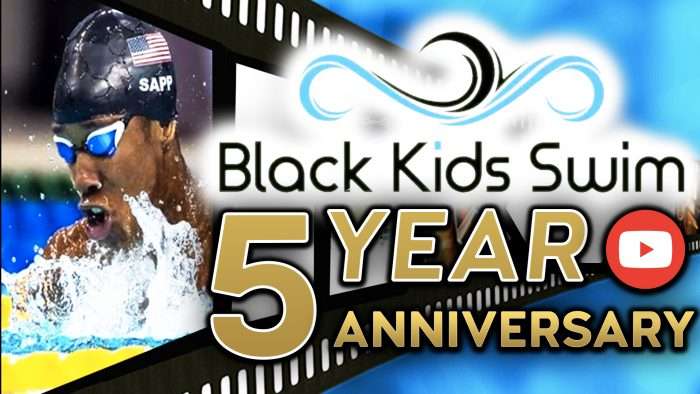
Black Kids Swim Announces Essay Contest Winners
Black Kids Swim is excited to announce the winners of the Black Kids Swim 2020 Essay Contest! Earlier this spring, swimmers of all ages were offered the opportunity to write about a topic tied to the sport of competitive swimming.
Swimmers eight years old and younger were asked to write a 200-word essay about “Why I Love Swimming.” The nine to 12 age group wrote a 500-word essay on “What I believe it takes to be an elite swimmer” and the 13 and up group wrote a 1000 word essay about “Do Black competitive swimmers have a responsibility to the Black community?”
Each winner received a Black Kids Swim warrior cap, BKS car magnet, and book by Roy Burch titled, Tri-Anew-Angle: Bermuda. To make sure these talented swimmers and writers stay fit, they also received 30 days of personal training sessions with MaxFit, owned and operated by Tabono dry land expert Joseph Koroma.
Two-time Bermudian Olympian, Roy-Allan Burch revealed the winners of the contest in a video. The retired athlete also took the time to congratulate the contestants on their hard work and the positive messages they are sending to our community:
Check out the winners and their essays below:
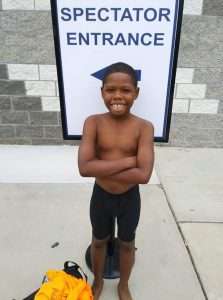
Photo: Khalid Ali
8 and Unders: “Why I Love Swimming”
Khalid Ali
I love swimming because it helps the body. And I want to be like Cullen Jones. I want to be a highly sophisticated swimmer. I want to be an Olympian swimmer. When I get into the water I feel like I can float off anywhere. I feel like I am the water.
9-12 Year Olds: “What I believe it takes to be an elite swimmer”
Ava Johnson
I believe what it takes to be an elite swimmer is good practice, and paying attention to the coach during swim practice.
I think almost all of the Olympic swimmers practice very well and they focus hard on what they’re doing. Olympic swimmers practice two or three times a week so they can get very good at swimming and win medals. The USA team gives a lot of tips on how to be a good swimmer and make it to the Olympics. According to their website, one of their tips is “You also need to get in the water! Without practice, you’ll just be a video watching and article reading expert. When you do get to the pool, your practice needs to reflect your level of ability.” This means that you need to get in the water even out[side] of practice. One of their earlier tips said to watch videos on how to do stuff properly. This is a continuation of their other tip. But it also applies to swimmers who don’t watch videos and actually go to practices.
The coaches are the ones who help you practice swimming and make you get better. They do this by teaching you a bunch of drills that you can do to get better at certain Strokes. They also do drills that will help you with form so you don’t get disqualified. They are the ones who cheer you on as you’re swimming your event. They help you a lot and you should pay attention to them because they are teachers of swimming and they help you learn so you can get better and win your competitions. All the Olympic swimmers that are in the Olympics today have coaches that helped them get through their events and get better. The coaches are the reason that they became so good at swimming and got all of their medals.
In conclusion, what it takes to be an elite swimmer is to practice well and listen to your coaches. These things will help you win competitions and other swimming meets that you have. There are many other reasons for how you can become an elite swimmer, but these are just some of them. I think many people would agree with me that these are some reasons how you can become an elite swimmer. I think you should too.
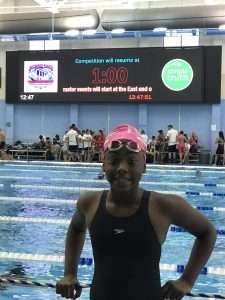
Photo: Ashanti Washington
9-12 Year Olds: “What I believe it takes to be an elite swimmer”
Ashanti Washington
In order to be an elite swimmer, it takes perseverance, sportsmanship, respect, and a lot more. For you to achieve your dreams of being a great swimmer you must be able to see yourself winning and never give up on yourself or other people. You must persevere and strive to be the best of the best. You can do this by never giving up, training, and by setting goals for yourself. These things will help you remember that you are not the best, but you can get better. You also should show respect to the coaches, staff, and officials. If we didn’t have these people, the swimming world would collapse. Being a great swimmer means that you always try to improve, but we can’t improve without our coaches’ help and if we disrespect them, they won’t help us be great and help us improve that is why we need to respect them.
Another way to be a good swimmer is by being a good sport and a teammate. If your team loses, clap because, at the end of the day, we all are on one big team. Zones showed me this. We all came from different teams and faced each other at other meets for weeks or even years for the older kids. So at Zones, it was hard to come together and become a great, big, strong team. One thing that helped me joining the Zones team for the first time was having older kids from my main team help and guide me through it and because most of them have already been to Zones for multiple years.
An elite swimmer takes corrections and never thinks they cannot improve. They make corrections and make sure they are doing them to their best ability. I personally don’t think that being fast really means you are a super good swimmer. A good swimmer knows they can improve and knows that they aren’t the best and even when they are the best, they don’t settle. They keep on trying to be the best because every single minute someone is training to top you or beat you, but you can’t let that happen.
You can’t settle. Someone is always training and the person that has the best mindset, the best goals, the best technique, and the best drive will always win. Because they understand what it takes to be an elite swimmer. To be a great swimmer is being the best your body will allow you to be without pain. Being an elite swimmer means pushing to be the best you can be even when it is hard.
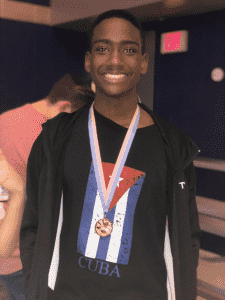
Photo: Reuben Williams
13 and Up: “Do Black competitive swimmers have a responsibility to the Black community?”
Reuben Williams
Being a black person in America inherently means that you have a target on your back. Black people can not wear hoodies, sag their pants too low, take a walk at night, sleep, go bird watching, hang out on a street corner, or simply go jogging in their own neighborhoods without being hunted. As soon as you walk out of the comfort of your home, you must realize what you can and can not do. As a community, Black people have been fighting for centuries to combat racism. We have made substantial steps, however, we are not done yet. One thing the Black community has always had is hope. I hope that one day we will be judged on our individual merit and actions as opposed to how dark the color of our skin is.
Growing up in the suburbs of a middle class predominantly white area, personally I’ve experienced my fair share of racism. There are a couple of events that instantly come to mind when I think of this. One time my brother and I went into a store and saw a friend working there. She was the former captain of my swim team before she graduated last year. She’s a 5-foot-6-inch smaller white girl, and to put that into perspective my brother and I are 6-foot and dark-skinned. We are sitting there laughing and talking for a little bit when her manager comes over. He looks at her and asks “Is everything alright? Do you need help here?” while giving a sideways glance to me and my brother. This may seem like a small incident, but in that moment I saw in his eyes that he perceived my brother and me as a threat. He saw us as intimidating and stepped in to “protect” his employee without even acknowledging us, the customers. Thankfully my friend assured him that everything was okay and explained that we were simply her swim friends. After that, he just walked away.
Another time I felt this way was when I was in line by myself at a supermarket. My mom asked me to run in the store really quick and get some lemons for her because she needed them to prepare the dinner. I walked into the store to get the lemons and headed to the checkout line with my $10. In front of me, there was a white lady who just finished paying and she hands the cashier a couple $20 bills and then gets her change and leaves. When I go up there with my 3 lemons I hand her the 10 dollar bill. She looks at me and holds the bill up to the light inspecting it like a detective to make sure it’s real. I remember sitting there thinking, “Is this lady crazy?! I’m trying to buy some freaking lemons for dinner and she thinks the money I gave her is fake. Does she really think a 16-year-old boy wants to use fake money to get 3 lemons?” This taught me that no matter what you look like or how old you may be, people still hold you to a stigma because of the color of your skin.
Throughout my academic career, some teachers have called me elitist and stubborn for speaking up for what I think is right. I tell you these little stories not because I want you to feel bad or sorry for me. I tell you them so you can understand that these little occurrences happen all the time, all over America trillions of times each and every year. Every day little Black girls and boys are taught by white adults that their voice does not matter or they seem “suspicious” or they’re intimidating. If you are not strong enough this could really mess with your mind and make you think that these things are true. The only way to tackle this problem we call racism is to do it together. United as one.
Cullen Jones. Simone Manuel. Maritza Corriea. Lia Neil. Anthony Ervin. These names are amongst the most celebrated when it comes to black swimming. All of these names are remarkable in their own right. Simone Manuel was the first African-American to win an individual gold medal in an Olympic game. Corriea is the only swimmer to hold an SEC title in every freestyle event. The barriers these five swimmers broke down are mind-boggling. It makes you ask how did they get there? I researched all of their origin stories and found that none of them did it alone. Every single one of them had a community around them that they could lean on for support. They may be the stars of the story but they would never be there if it were not with support from other determined black people. One thing that I love about swimming is that once you’re in the water nothing matters except how fast you can get to the wall.
Black swimmers have a huge responsibility to the black community to help them and provide them with opportunities. No one can build themselves up on their own. As the old saying goes, “It takes a village.”
On the Zoom call with the Howard University swim and dive coach, he said “Howard University is a special place with a special swimming and diving program. Our role is to continue pouring back into the sport that gave us so much.” This quote perfectly illuminates the point I have been making. I would assume that Coach Nick did not get to where he is today without help. Being a black man in America, he also realizes black youth are already at a disadvantage.
African-Americans are already behind when it comes to learning how to swim and drowning rates. For instance, many communities of color do not have access to pools. Also, some families simply can not afford swimming lessons. The task of fixing these problems may seem impossible but there is a solution. As black men and women, we need to understand that all black swimmers have a responsibility to build each other up and support one another.
Congrats again to all the winners!
And a huge thank you to all the other swimmers who participated:
Here’s an excerpt from Leah’s essay on Black competitive swimmers’ responsibility to the Black community:
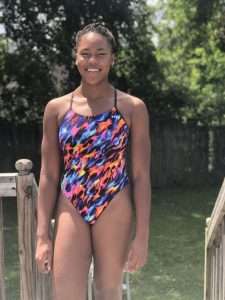
Photo: Leah Ashby
“Wow! You swim! That’s great because I swim like a rock.” This is one of the many responses I receive as a Black swimmer when I inform another Black person that I swim. Everywhere I go Black people ask me if I play basketball or run track, but never ask if I swim. This is the case for many Black competitive swimmers. The stereotype “Black people cannot swim” is embedded into the heads of many Black and white people across the United States. Many Black people do not swim. Not because they are incapable, but because they have never considered swimming, or the opportunity was never presented to them. Over the years, we have seen Black swimmers climb to the top tier of swimming, but they are few and far between. It is our responsibility as Black competitive swimmers to not only inspire our people but provide opportunities for our community to reap the benefits that swimming has to offer…. As Black competitive swimmers, we can teach our neighbors, their children, and our own siblings to help decrease the number of drownings in the Black community.
As always, Black Kids Swim and our partners like Roy Burch and MaxFitt will continue to do the work of uplifting our children and promoting the amazing initiatives the Black community is doing to support our kids. Make sure to be on the lookout for more activities sponsored by Black Kids Swim in the future!




